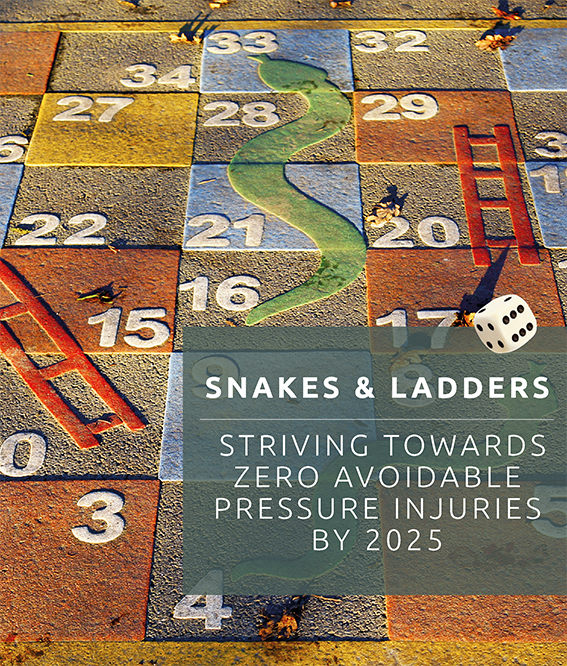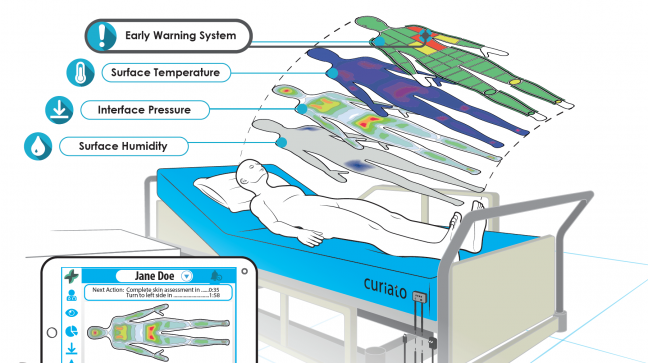It is fitting to consider how the application of Artificial Intelligence (AI) and data science can bring us towards the elimination of pressure injuries/ ulcers on the worldwide Stop Pressure Injury day. The approach is so refreshing that it could help us tip the balance towards zero avoidable pressure injuries.
Here we preview an exciting new proceedings report titled Snakes & Ladders on how data science and Artificial Intelligence can create a paradigm shift in managing those at risk of wounds.
Refreshing thinking to an age-old problem
I have spent much of my healthcare career in wound care. A ten-year span of which was centred around the use of pressure redistribution mattress technologies to reduce the risk of pressure injuries/ pressure ulcers. Most innovations are incremental improvements over its predecessor. The car industry is a classic example. It is rare to encounter someone approach an age-old problem from a startling new vantage point, unhindered by all the baggage of what has gone before. This is one such example which has sucked me right in.
“An expert panel reviewed why for more than 25 years pressure injuries have existed after the formation of wound care societies and international pressure ulcer advisory panels. In this proceedings report we explore why the management of pressure injuries can be improved with data science,” says Matthew Sefati, co-founder of Curiato. “We’ve developed a skin monitoring platform with its first clinical use case for the detection and prevention of pressure injuries. Data science can be used to change the paradigm shift in how we view and prevent pressure injuries.”
DOWNLOAD THE SNAKES & LADDERS PROCEEDINGS REPORT
Application of data science and Artificial Intelligence to pressure injuries/ ulcers
[arve url=”https://youtu.be/VOpLZXn9SoI” title=”Matthew Sefati | Snakes & Ladders proceedings report” description=”The Curiato Inc Snakes & Ladders proceedings report examining the application of data science and AI to pressure injuries/ pressure ulcers” duration=”1M8S” /]
Matthew Sefati, Co-founder & COO of Curiato shares the new proceedings report.
I first encountered the Curiato team when Co-founder Zied Etleb presented to the Hacking Health Waterloo cafe. It followed their win of the University of Waterloo inaugural Hack4Health. This is a smart team, based at the University of Waterloo Velocity Garage within Communitech in Kitchener. Much of my work as an advisor has been plugging them into the wound care community. There is a wealth of expertise within Ontario and Canadian wound care.
Stop the Pressure

I was one of the pioneers that created the Stop Pressure Ulcer Day on Twitter as early as 2012 while working in conjunction with the European Pressure Ulcer Advisory Panel (EPUAP). The social channel has become a mainstay for spreading the annual awareness day. The tweets from nursing teams are evidence of the incredible work going on worldwide to build the zero pressure injury days. The terminology transitioned from pressure ulcer to pressure injury a couple of years ago. I hear that there may be a necessity to go back to the pressure ulcer term. Watch this space! Join the Stop The Pressure campaign and get tweeting.
Waterloo MedTech
Curiato was among the seven top entrepreneurs at the Waterloo MedTech showcase, where Moazam Khan, Co-founder & CEO gave a pitch presentation. Re-imagining Healthcare 3.0 was a recurring theme at the conference. Dr. Alex Wong, Canada Research Chair in Artificial Intelligence and Medical Imaging commented that.
“Every medical company is now trying to become an AI company.”
While that may be true, the market leaders will struggle to keep pace with the fast and agile start-ups like Curiato. The refreshing approach using data science explains why they have been a recipient of the Centre for Aging Brain Health Innovation (CABHI) $1m I2P2 funding research at the Salvation Army’s Toronto Grace Health Centre.
DOWNLOAD THE SNAKES & LADDERS PROCEEDINGS REPORT

Images courtesy of Curiato.

